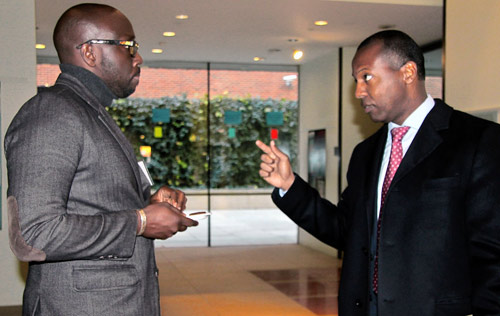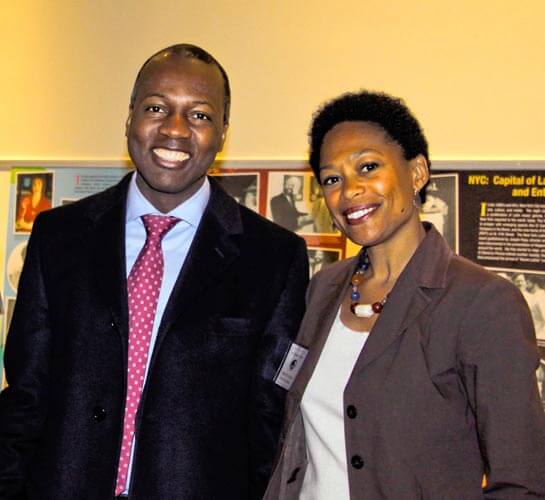Diaspora in Dialogue: A Haitian Identity Symposium held at NYU last month attracted a varied assemblage of panelists of all ages, from varied disciplines sharing their perspectives on the subject of identity. Held at the Center for Latin America and Caribbean Studies and co-presented with Haiti Cultural Exchange, the day-long conversation engaged scholars, artists, and activists.
Haiti’s Ambassador, Jeremie-born Paul Altidor gave a thoughtful presentation without notes, emphasizing that when he speaks of the Diaspora, it applies to him. “I am Diaspora,” he said. The ambassador arrived to Boston from Haiti in 1986, completing his secondary education in the U.S., continuing his studies here.
“On an individual level, we’ve achieved the American dream,” he said. Then he took the audience through the immigration stages that Haitians in the U.S. have experienced: Denial and rejecting, accepting deep Haitian roots to embracing Haitian ancestry and culture.
[Throughout the symposium, various speakers reminded the group of enduring negative stereotypes attributed to new Haitian immigrants when they were growing up in 80s in the U.S. Particularly difficult were being teased for country bumpkin clothes, being called “Frenchie” (their accent), and being included in the group as carriers of HIV AIDS–the four H’s–homosexuals, hemophiliacs, heroin addicts, and Haitians.]
He alluded to the big disconnect between the successes those in the Haitian Community are achieving in the U.S. – the American dream–and the dysfunction of the home country. He challenged attendees, “How do we translate our (societal) successes into something positive for our ancestral country.” He also asked, “I have a young daughter born here. How will her Haitian roots fit into her life?”
He reminded attendees that after the earthquake, there was a window of opportunity of good will and that this opportunity should not be squandered.
Following the ambassador’s keynote address, poet Jeffery Dessources gave a keynote performance. The arts are never far from the Haitian soul.
The day of relevant panels then began. Historical foundations from the 60s to now, “The Generational Haitian Immigrant Experience” with activist Brooklynite Jean Vernet, who came to NY in the 60s, NYU professor Millery Polyne, community organizer Anhonine Pierre, and social media guru Alice Backer provided details and analysis.
The mid-day panel focused on Vodou and Perceptions of Haiti. Fabrice Armand relayed how the earthquake was pivotal in reconnecting with Haiti in the Diaspora Identity and Going Back panel. “Cultural identity is something you create,” said businessman Alain Leroy. “It’s a perpetual process.”
Designer Dayanne Danier spoke about the organization she founded with Jenny Batista– Fleur De Vie– that supports community outreach programs in Haiti. They’ve organized visiting groups that spend one action-packed day in a fun day camp atmosphere in vulnerable areas. Just prior to the school year, and the event ends with distributing school supplies to the children.
Linda Thelemaque former member of Haitian American Alliance founded Project Istwa, two years ago, which uses photography for Haitian youth as a means of expression and empowerment.
The final panel on the Haitian artist included filmmaker Jerry LaMothe (Blackout), Charlot Lucien (storyteller, poet, visual artist), university professor Jerry Philogene, and poet Jeffery Dessources.
Among the questions participants were asked to think about were: What do they think of Vodou; how can we change negative perceptions; how can we build on the positive, now, and what is Haitian art? For more information on Haiti Cultural Exchange, visit www.haiticulturalx.org.

Photo by Tequila Minsky
























